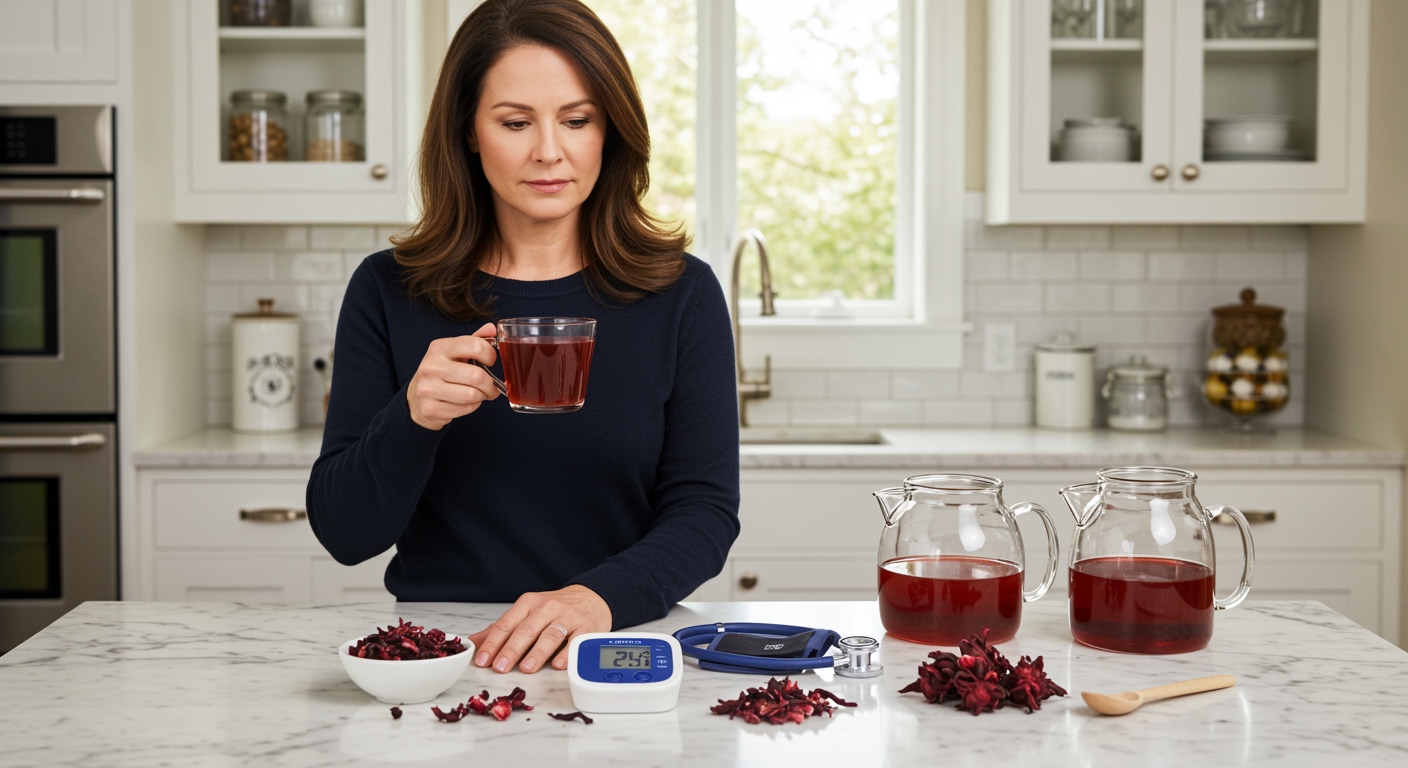✪ Key Takeaway: Hibiscus tea can lower blood pressure further, making it potentially dangerous for people with already low blood pressure.
Introduction
You reach for that beautiful ruby-red hibiscus tea thinking it will boost your health.
But what if this popular herbal drink is actually making your low blood pressure worse instead of better.
Hi, I am Abdur, your nutrition coach and today I am going to explain exactly how hibiscus tea affects your blood pressure and whether you should avoid it completely.
How Does Hibiscus Tea Actually Lower Blood Pressure?
Hibiscus tea contains powerful anthocyanins and other bioactive compounds that directly affect your cardiovascular system.
These natural chemicals work like mild ACE inhibitors, which are prescription medications doctors use to treat high blood pressure.
When you drink hibiscus tea, these compounds help your blood vessels relax and widen.
This process is called vasodilation, and it reduces the pressure your heart needs to pump blood through your arteries.
Research shows that drinking hibiscus tea can lower systolic blood pressure by 7-13 mmHg in people with high blood pressure.
But here is the problem: these same mechanisms work regardless of whether your blood pressure is high, normal, or already low.
✪ Fact: Hibiscus tea can reduce blood pressure within 2-6 weeks of regular consumption according to clinical studies.
What Happens When You Have Low Blood Pressure?
Low blood pressure, also called hypotension, means your blood pressure reading is below 90/60 mmHg.
When your blood pressure drops too low, your organs do not get enough oxygen-rich blood to function properly.
Your brain is especially sensitive to these changes because it sits at the top of your body and relies on adequate blood pressure to receive nutrients.
Common symptoms of low blood pressure include dizziness, lightheadedness, fainting, fatigue, and difficulty concentrating.
Some people experience these symptoms when they stand up quickly, which doctors call orthostatic hypotension.
Adding hibiscus tea to your routine when you already have low blood pressure is like pressing the gas pedal when your car is already going downhill.
✪ Note: Blood pressure below 90/60 mmHg is considered low and may cause symptoms in many people.
Can Hibiscus Tea Make Your Symptoms Worse?
Yes, hibiscus tea can definitely make low blood pressure symptoms more severe and frequent.
The blood pressure lowering effects of hibiscus tea do not discriminate between people with high or low starting blood pressure.
If you already feel dizzy or lightheaded from low blood pressure, drinking hibiscus tea regularly can make these symptoms worse.
You might notice increased fatigue, more frequent dizzy spells, or even fainting episodes after adding hibiscus tea to your daily routine.
The timing matters too because hibiscus tea effects can last for several hours after drinking it.
This means your blood pressure could drop at inconvenient times when you need to be alert and focused.
✪ Pro Tip: Monitor your symptoms closely for 2-3 weeks if you decide to try hibiscus tea with low blood pressure.
Are There Any Safe Alternatives For Low Blood Pressure?
Instead of hibiscus tea, focus on beverages and foods that can help stabilize or raise your blood pressure naturally.
Green tea contains caffeine which can provide a mild blood pressure boost without the dramatic lowering effects of hibiscus.
Coffee is another option that can help raise blood pressure temporarily through its caffeine content.
Adding more salt to your diet under medical supervision can help increase blood volume and raise blood pressure.
Staying well hydrated with plain water helps maintain adequate blood volume which supports healthy blood pressure.
Small frequent meals instead of large meals can prevent blood pressure drops that sometimes happen after eating.
✪ Note: Always consult your doctor before making dietary changes to manage low blood pressure symptoms.
The Bottom Line
Hibiscus tea is not a good choice if you have low blood pressure because it will likely make your condition worse.
When your blood pressure is already low, the last thing you need is something that lowers it further.
I would love to hear about your experiences with hibiscus tea or any questions you have about managing low blood pressure naturally in the comments below.
References
At NutritionCrown, we use quality and credible sources to ensure our content is accurate and trustworthy. Below are the sources referenced in creating this article:
- USDA Agricultural Research Service: Study Shows Consuming Hibiscus Tea Lowers Blood Pressure
- WebMD: Health Benefits of Hibiscus
- Healthline: Hibiscus Tea Benefits
- PMC: Effects of Hibiscus Tea on Blood Pressure





